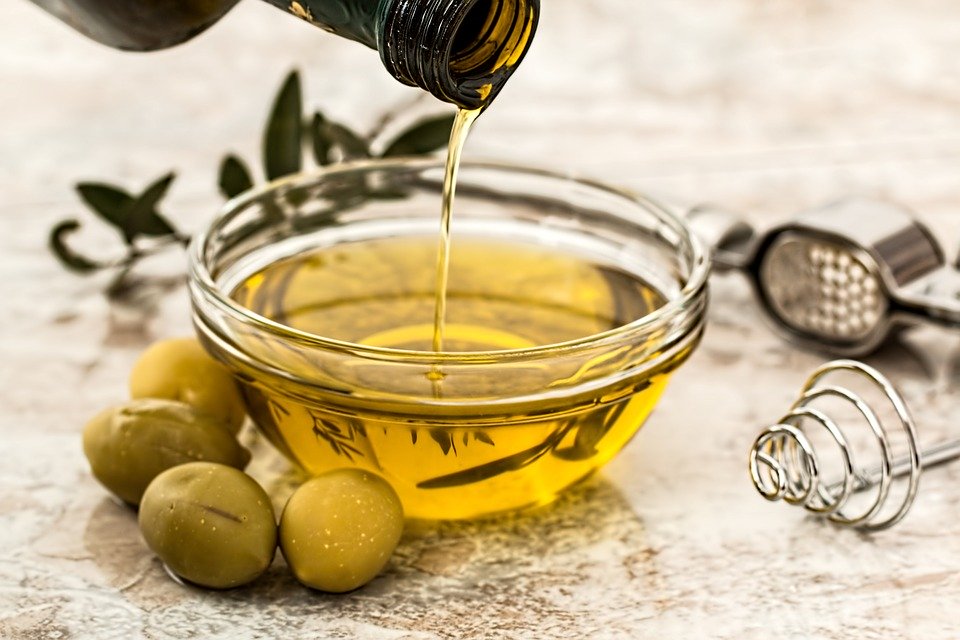SIKS Standards of Kosher Certification
SIKS Kosher Certification follows the regulations of Kashrut (Jewish dietary law) which means suitable and ensuring fitness for consumption. For a product to be Kosher certified each ingredient, or food additive used in its production must also be Kosher. Moreover, the production process must be suitable for Kosher requirements and therefore it must be approved by a Kosher auditor.
Kosher certification plays a very important role in increasing the sales of a food company. We at SIKS will help to increase your sales and exports via Kosher certification and help to market your Kosher certified status.
Some products cannot be Kosher Certified at all, for example the pork, horse, frogs, rabbit meat, sea fruits…
Therefore, the products containing Pork or other non-Kosher animal cannot be Kosher Certified or alternatively the company can choose to replace the ingredient with another one more conform.
Another important rule: the Dairy and Meaty products cannot be produced together.
It implies that every product containing a meaty ingredient must be mentioned near the Kosher symbol as meaty – the same for a product containing Milk or any other dairy ingredient must be mentioned as dairy.
1. What’s mean “Kosher”?
Kosher is a Hebrew word that means fit, proper or correct. Nowadays, it is mostly used to describe food and drink that complies with Jewish religious dietary law. This word also refers to religious dietary laws, followed by Jews, which have been applied to the increasingly complex world of food ingredients and food production. Kosher certification benefits those following a Kosher, Halal or vegetarian diet and those with food allergies.
2. A few notions of what is Kosher food
DAIRY
Dairy products must come from Kosher animals. In countries where the source of milk is guaranteed by civil law (e.g. in the EU and USA), some Jewish authorities allow milk products without full-time Kosher supervision. Some communities still require their milk to be fully supervised; and this is known as Cholov Yisroel. Cheese products do not fall under the general dairy category, and require full-time Kosher supervision because rennet is often derived from an animal source.
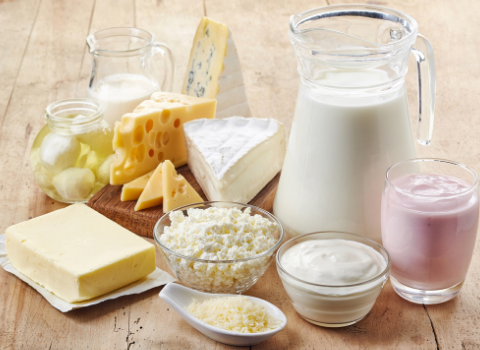
EGGS
Eggs are only Kosher if they are from a Kosher bird and do not contain any blood spots.
The basic rule of kashrus is that the product of a non-Kosher animal is not Kosher. Therefore, all eggs from non-Kosher birds (and non-Kosher fish and animals, such as turtles,) are not Kosher.
To be Kosher, eggs must come from Kosher fowl and be free of bloodspots in the white (albumin) and the yolk. Each egg must be checked individually after it is opened. If there is blood in an egg, it is forbidden.


FISH
Kosher fish are species that have fins, and scales that are easily removed. Common examples include: salmon, tuna, sole and plaice. The scales of a sturgeon are extremely hard to remove – hence it is deemed to be not Kosher. Common examples of non-Kosher fish include: all shellfish, eels, shark, monkfish, huss and catfish. Roe and fish derivatives such as fish oil and gelatine must come from Kosher fish.
To be Kosher, eggs must come from Kosher fowl and be free of bloodspots in the white (albumin) and the yolk. Each egg must be checked individually after it is opened. If there is blood in an egg, it is forbidden.

PARVE
Food that does not contain any meat or dairy ingredients is known as Parve, neutral. For a food to be certified as Parve it must also not share production equipment with meat or dairy products when these are produced at a temperature above 40°C. Parve foods may include egg and fish.
On the whole, Parve foods present fewer Kosher complexities than either meat or dairy foods.
INSECTS
All insects are considered strictly non-Kosher. To ensure the absence of insects fruit and vegetables have to be thoroughly inspected and cleaned. Use of pesticides may be insufficient as these may kill the insects but not remove them… Therefore, a bowl of salad which may look Kosher, could have a lot of non-kosher ingredients (bugs) and prohibitions. often over half a dozen species can be found on one head of lettuce. Usually, something as small as an insect would be “batel” (anulled) in a large volume of permissible food.
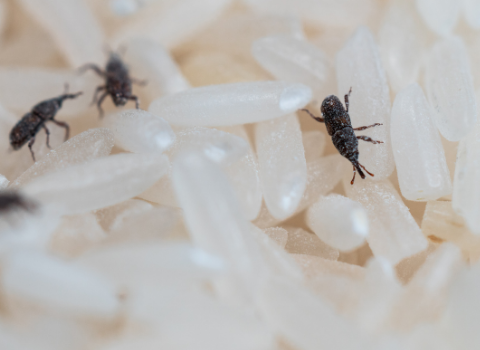

In the case of insects, however, this is not the case. The reason is that we have a rule which states that a complete creature cannot become nullified. Therefore, a worm on the bottom of a tequilla bottle does not become nullified by the liquid. However, if a person cooked soup and found a fly floating in it later, the fly should be removed and the soup will now be permissible. If there were three or more insects in the food, we have to assume that it was infested with insects and must be sifted, strained etc.
BEVERAGES
Juices and juice blends of any fruit or vegetable available to man, teas and drinks made of any flavor imaginable, diet or no-carb, fortified with vitamins and minerals and sports and energy drinks, all perceived to be of more nutritional value and beneficial to one’s health, are fast replacing carbonated beverages as the first choice of many people, including those that keep Kosher.
Companies all over the world have been seeking Kosher certification to provide Kosher certified non-carbonated beverages to the large growing market of consumers who have asked for them. The growth of Kosher certification for the beverage industry has provided a unique challenge to kashrus agencies, because beverage companies require a significant amount of involvement and scrutiny.
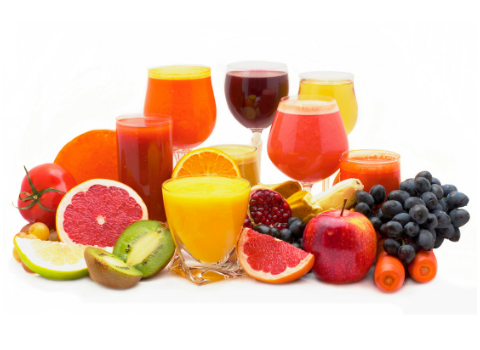
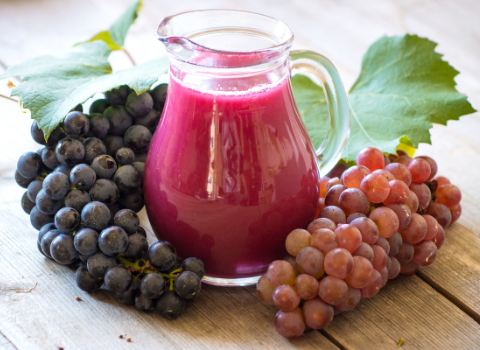
By far the most common reason for Koshering in a juice plant is because of the production, entrenched in many juice plants, of non-certified grape juice. It is well known that all vegetables and fruits and their natural juices are inherently Kosher. The exception to this is the grape. In Jewish laws, there are specific requirements that need to be met in order for grape juice to be acceptable. If any of these requirements are not adhered to, not only is the juice, wine or products derived or containing them not acceptable to consume, but in addition they render non-Kosher any equipment used in their production, kept in them for more than twenty-four hours or heated in them at a very high temperature.
Beverages manufactured from grape or grape-based derivatives may only be drunk if the grapes come from a Kosher winery, prepared under strict Rabbinical Supervision.
If non-Kosher grape juice is not being used, kashrus agencies still advise that all ingredients used in a plant should be Kosher certified even if the particular product that a given ingredient will be used in is not certified and even if it takes place on lines where certified products are never run. This practice eliminates the possibility of mix-ups, which may require down time, Koshering and possible recalls.
CHOCOLATES
Chocolate is made from ingredients that are inherently Kosher, like cacao beans, sugar and vanilla beans. Other ingredients, like soy lecithin, an emulsifier that adds smoothness to the bar, and extra cocoa butter, which is added for better mouthfeel, must be Kosher-certified.
There are several factors that are important in making sure that chocolate is Kosher. Often in the manufacture of commercial chocolate, a percentage of the cocoa butter (fat deriving from the cocoa bean) is replaced by a cocoa butter equivalent (CBE) or a cocoa butter substitute (CBS). The leftover cocoa butter is sold to the pharmaceutical and cosmetic industries, because it is a valuable ingredient in cremes, lipsticks…


These fats can be problematic in two ways:
1. they might be of unspecified origin (always a no-no in anything Kosher)
2. they might not be Kosher for Passover, such as soy lecithin (very inconvenient, because the product could not be used during the Passover festival, in making chocolate coated matzah, for example).
So, in general, it is best for Kosher chocolate producers to stick with the good stuff (cocoa butter), which is what chocophiles want anyhow.
Another big deal (especially depending on how Kosher you are) is whether the chocolate is considered “dairy” or “Parve” – ‘neutral’ – not containing any dairy or meat products. Dark chocolate (without any milk) used to be considered “pareve” by definition, but this excellent article by SIKS Kosher Certification explains that this isn’t really the case (again, depending on how Kosher you are), because often “Parve” chocolate is manufactured on equipment which has processed dairy.
Why does “Parve” chocolate matter, anyhow? It matters because Kosher Jewish cooks make a lot of Shabboth meals (eaten on Friday evening), which are traditionally meaty. If you want a chocolatey desert, it needs to be “Parve”. That’s a big deal in the Jewish world.
PASTA
All plain dried durum wheat pasta and wheat noodles, including pasta containing egg, is permitted, but the Kashrut supervisor must make a visit to the manufacturer to verify that he does not produce sauces containing non-Kosher products, meat or cheese in his factory.
Kosher certification is therefore required for pasta.
Pasta which is coloured and flavoured with vegetable extracts such as spinach or tomato must have a Kosher certification for the ingredients (spinash powder).
Black pasta containing squid ink is not Kosher. Fresh pasta is not permitted.

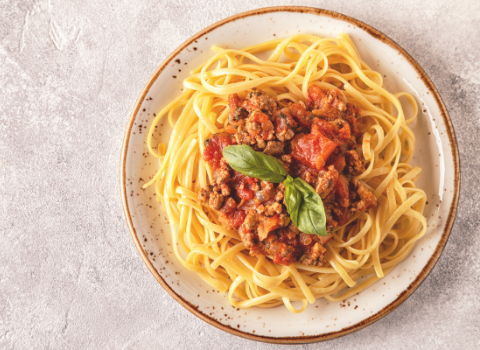
All plain dried durum wheat pasta and wheat noodles, including pasta containing egg, is permitted, but the Kashrut supervisor must make a visit to the manufacturer to verify that he does not produce sauces containing non-Kosher products, meat or cheese in his factory.
Kosher certification is therefore required for pasta.
Pasta which is coloured and flavoured with vegetable extracts such as spinach or tomato must have a Kosher certification for the ingredients (spinash powder).
Black pasta containing squid ink is not Kosher. Fresh pasta is not permitted.
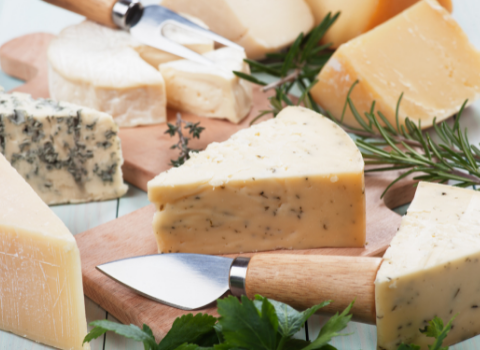
KOSHER CHEESE
The consumption of kosher cheeses is also subject to certain laws. The primary consideration involves the prohibition of mixing meat with dairy. Due to this guideline, cheeses mixed with meat or meat products cannot be considered Kosher. Although rennet* can be obtained from animal sources, the enzyme does not qualify as meat and can, therefore, be used to make Kosher cheeses. Some households follow this practice to a strict degree, often waiting for one to several hours in between eating meat and cheese, and using separate sets of dishes and utensils for meat and dairy foods.
The production of Kosher cheeses is largely affected by the use of rennet, the enzyme that aids in the separation of milk curds from whey. Rennet is most commonly extracted from animal stomach linings, which makes cheese production open to incorporating non-Kosher sources. Cheeses must be made with rennet from kosher animals, vegetables, or from microbial sources in order to be considered Kosher.
In addition, animal-based rennet can only be considered kosher if the source animals were slaughtered according to shechita, the traditional Jewish method of ritualistic slaughtering. In this regard, it is a commonly-accepted practice to have orthodox Jews present during cheese production to ensure the standards of Kashrut are upheld; some branches of orthodox Judaism, particularly among Haredi Jews, go so far as to require it.
* Rennet is an extract from the fourth stomach of young ruminants, such as cows, goats, and sheep. It contains a number of enzymes that are designed to help these animals digest their mother’s milk, and when added to milk, it will cause the milk to coagulate, forming the curds and whey that are so essential in the cheesemaking process.
We take care of all Kosher cheese production in an establishment run by a non-Jew.
We send our Kosher supervisors who take care of the cleaning and all the procedure for making Kosher cheeses from supervised milk (H’alav Shamur).
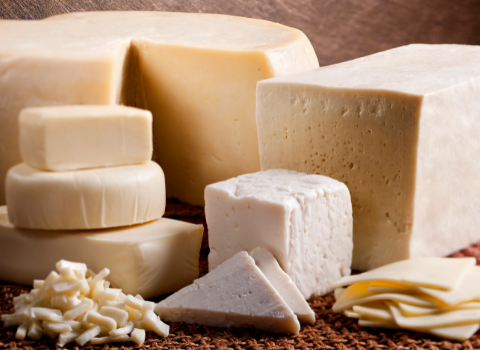
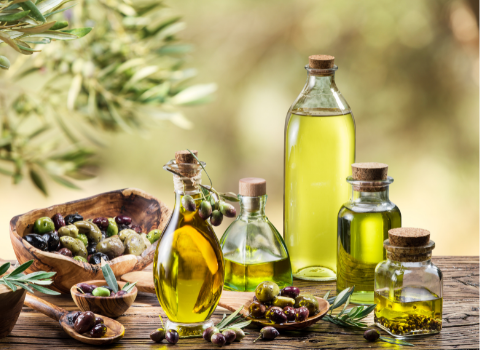
OIL & OLIVE OIL
Extra-virgin olive oil comes from the first pressing of the olive, contains the lowest level of free fatty acids, and has the lightest color and flavor. Virgin oil comes from additional pressings of the olives but has a higher level of free fatty acids and thus a stronger taste. Both of these types of oil are generally not refined. Pomace oil is extracted from the olive “cake” that is left after the initial pressings. The oil is removed from the cake by pressing or with petroleum solvents, and is the lowest quality olive oil.
Because of the impurities and flavors inherent in this grade, it is generally refined. Refining, a process used in the production of most vegetable, marine, and animal oils, involves heating and filtering the oil to purify and standardize it. Unfortunately, vegetable oils (including olive oil) are often refined in the same equipment as non-Kosher animal and marine oils, rendering otherwise Kosher vegetable oils to be non-Kosher.
Today, olive oil has enjoyed a resurgence in the market, owing both to its perceived health value as a highly monounsaturated oil and to its unique flavor profile. This newfound popularity—and higher price— has not been without its pitfalls. Although it had been assumed that all extra-virgin olive oil was free of refining and contamination concerns, recent research has indicated that olive oil—including extra-virgin—is susceptible to adulteration. The outlying areas in the many countries where it is produced further complicates our ability to monitor the purity of the product. Extreme vigilance is therefore required of the Kosher certification agencies to ensure that Kosher olive oil is indeed exactly that.
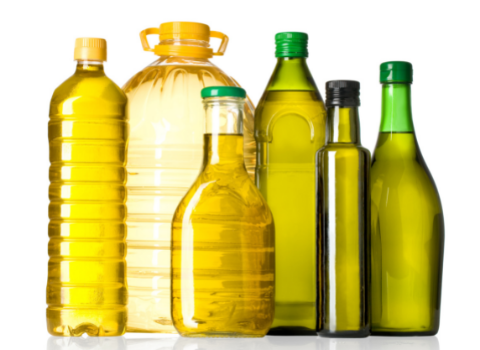
PASSOVER
Olive oil has always enjoyed a special place in Pesach foods. It has historically been the vegetable oil universally accepted as being free of any concerns of Kitniyos. (Many otherwise Kosher oils, such as soy, canola, and corn, are avoided by Ashkenazic Jews during Passover.) In addition to concerns of possible adulteration with less expensive non-Passover oils, modern technology has created complications for this erstwhile paradigm of Kosher for Passover oils.
Olives (as do many fruit) yield the greatest amount of juice when they overripe. During the ripening process, certain enzymes are produced naturally that break down the pulp of the olive, allowing the oil that is entrapped to come out more easily during pressing.
Today, these enzymes (cellulases and pectinases) are produced commercially and added to ground olives, allowing olives to be pressed without such a delay. Many of these enzymes may be considered Chometz (leaven). Verifying that any enzymes used are indeed Kosher for Passover is therefore important.
Another Pesach concern involves the use of citric acid. Minute amounts of metal ions occur naturally in all vegetable oils, which can affect the color and flavor of the oil. Citric acid is often added to bind to these ions and render them harmless (chelation), and the Passover status of the citric acid must be verified if it is used. It has also been reported that chlorophyll preparations have been added to fortify an “olive green” color, the Kosher status of which should also be verified.
Even if a product lists acetic acid as an ingredient, it may first be soaked in non-Kosher vinegar and then in acetic acid. Lactic acid is often added to green olives, and may pose a Passover concern. Ferrous gluconate is often added to black olives to maintain their firmness. As with all fermentation products, the gluconic acid used in its production requires a reliable Kosher certification.
ESSENTIAL OILS
One of the major methods of extracting the flavor components of spices is by extracting their “essential” oils. Indeed, oil is the primary source and carrier of flavor in many types of food, which is the reason that formulating tasty “fat-free” products poses such a challenge.
Essential oils may be recovered using a variety of processes, each with its own Kosher certification concerns. Citrus oils, such as orange, grapefruit, and lemon, are found in the outermost layer of the rind, known as the “zest”.
The zest is typically cold pressed, which means that the oils are expressed without using any heat or solvents. The oil is located in tiny sacs within the rind, which are ruptured during the pressing. After pressing, water is used to wash the droplets of oil from the rind, with the water subsequently removed through distillation. The flavor of citrus oils differs not only from species to species, but even from variety to variety within the same species.
Oils and other plant components can also be removed from botanical products using a process called solvent extraction.In this process, the botanical is steeped in a solvent, usually an organic material such as hexane or alcohol, allowing the oil and other soluble material from the plant to dissolve in the solvent. The resulting solution is then heated under vacuum to allow the volatile solvent to evaporate, allowing recovery of the extracted plant material. Indeed, solvent extraction using hexane is the primary method by which soy and canola oils are extracted.
Solvent extractions can be used to produce oleoresins, concretes, resinoids, and absolutes. A concrete is an extract of plant material that contains many components, including waxes, and is generally a solid or semi-solid, as its name implies.
An absolute is a purified form of a concrete, where alcohol is used to dissolve and remove the undesirable waxes, yielding a more potent product.

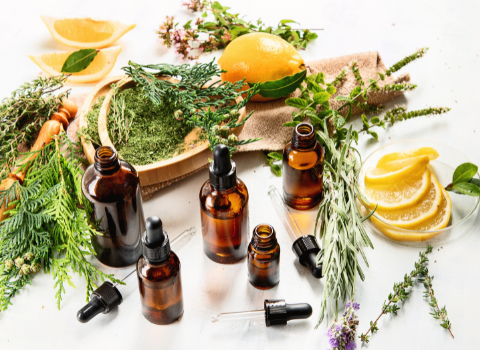
An oleoresin is a liquid extract that contains the essential oil plus other important non-volatile components that characterize the flavor, color and other aspects of the starting raw material.
A resinoid is a solvent extract of resin, which is a gum or sap that exudes from the plant, as opposed to an extraction of the plant itself.Such processes involve several concerns. First, the Kosher status of the solvent must be verified. While hexane is an inherently Kosher material (it is derived from petroleum), much of the ethyl alcohol produced in Europe is derived from non Kosher wine.
Alcohol extracts and absolutes therefore require reliable Kosher certification from an acceptable Kosher certification agency.
The production of oleoresins poses other concerns, in that their production often involves the addition of other vegetable oils and emulsifiers. A related product, called Aquaresins®, are water-soluble versions of oleoresins, where the oil-product raw material is blended with emulsifiers in order to allow them to be water miscible.
Infused oils are produced by soaking a flavoring agent, such as garlic or truffles, in a vegetable oil, allowing the flavor and aroma of the spice to mix with the oil.
All such oils and emulsifiers pose significant Kosher certification concerns.
SPICES, SEEDS, PULSES…
Pure spices are botanicals, parts of plants that are naturally Kosher. However, spices are often dried as a means of preservation. The method by which they are dried may pose significant Kosher certification considerations. Most spices that are dried in the country of origin are dried either in the sun or on equipment generally reserved for those products. As such, they pose little Kosher certification concern.
While insects are a major Kosher certification concern in many types of vegetables, Jewish law stipulates that insects must be removed from all spices and vegetables. In general, spices are dried either in the sun or with heated air in equipment used specifically for that product. Freeze dried spices, however, pose special Kosher certification concerns. In this process, the vegetable is first frozen and then subjected to a vacuum, causing the moisture to be drawn from the food through sublimation.

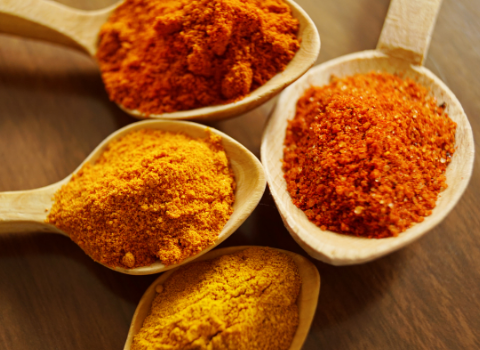
The advantage is that the vegetables are not subjected to significant heat, and tend to retain more fresh flavor and texture. The problem is that the equipment used for this process is often used to process meat, fish, and other non-Kosher products. A reliable Kosher certification is therefore required whenever freeze-dried spices are used.
When spices are ground, chemicals are sometimes added to prevent them from caking or otherwise deteriorating. Stearates are often used for this purpose, and pose significant Kosher certification concerns in that they are often derived from animal fats. While other innocuous additives can be used for this purpose, one must ensure that garlic and onion powders, for example, contain only Kosher certified anti-caking agents.
Additional concerns with powdered spices are based on the fact that they are often blended or packaged in equipment used for non-Kosher products. For example, soup blends containing powdered chicken or beef can be blended and packaged on the same equipment as pure spices. The cleaning procedures at such factories are not necessarily sufficient to ensure that no cross contamination takes place, and it is therefore imperative that a reliable Kosher certification be in place.

COFFEE
Coffee is thought to have originated in Kefa, Ethiopia, and subsequently transplanted to Arabia for commercial production (hence the term “Arabica” beans).
All coffee is made by roasting green coffee beans of several varieties of tropical evergreen called Coffea. After roasting, the bean is ground and steeped in boiling water allowing the flavor (and caffeine) to be infused into the water. Instant coffee is produced by taking this coffee-infused water, concentrating it, and drying it into a powder. This powder, produced through spray drying or freeze-drying, is a highly concentrated form of the coffee infusion, and can be reconstituted and diluted to make regular strength coffee. Kosher certification issues relating to such coffee revolve around the equipment and chemicals used in their production, as well as additional flavors that may be added.
Generally, equipment used to roast coffee beans is not used for anything but coffee (or other products that pose a general Kosher certification concern). Flavored and in general unflavored roasted beans may be purchased with a special Kosher certification, because the Rabbinic coordinator has to check the manufacturing process. The flavor in flavored coffee beans (e.g., hazelnut, vanilla, chocolate, cream, etc.) is added to the beans after they are roasted (roasting flavored beans would cause the flavors to evaporate from the bean). The flavors used in such products are extracts of flavor source that are absorbed into the coffee bean, not pieces of hazelnut, vanilla bean, chocolate, or milk itself. As such, many dairy-type flavors, such as “Irish Cream”, may indeed be Pareve (no trace of milk or milk powder). All flavored coffees, however, require a reliable Kosher certification.

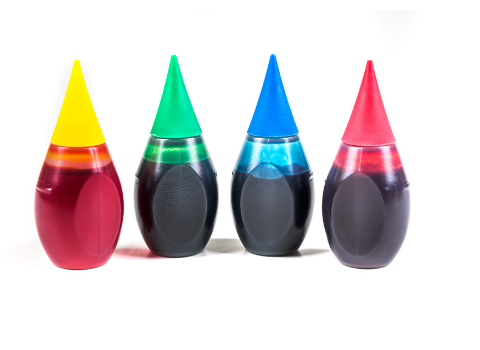
FOOD COLORANTS
There are three classic types of colorants: natural, nature identical, and synthetic, with each class having benefits and drawbacks. Natural pigments are those extracted from animals, plants or minerals. Common examples are carotenoids, anthocyanins (for instance, grape skins) and chlorophylls. Natural colors are more regulated than natural flavors. In order to be a “natural color” the added coloring has to actually be native to the item. If the pigment is not naturally found in the particular food (example beet juice in strawberry ice cream) the product label cannot state “natural color added”. Drawbacks for the manufacturer include greater variability, insufficient supply, and higher expense.
Natural colorants are sometimes manufactured on non-Kosher equipment, such as spray dryers. While most synthetic food colorants do not require a Hechsher, FD&C lakes can be problematic. Lakes often utilize dispersion agents which can include oils, glycerin and corn based syrups (which are not approved for Passover). Natural colors are, for the most part, Kosher, assuming that the facility does not produce non-Kosher colors on the same equipment.
The famous exception to this rule is cochineal, a red pigment extracted from female insects of the coccoides and aphimiden families. It takes 80,000 to 100,000 insects to produce one kilogram of this pigment. The purified version of this dye is called carmine or carmine acid lake. It was highly coveted as a dye in the 16-19th centuries, but its appeal has fallen sharply due to high cost and availability of synthetic colorants. However, carmine is still added to some meat products and maraschino cherries.


FOOD ADDITIVES
Intentional additives are actual ingredients, and these usually must be indicated in some manner on the label. There are some cases in which the label can be misleading. Some ingredients can be lumped together rather than listed individually. There are ingredients which cannot be readily identified. Acetone-3-hydroxy-3-butanone, though it may sound formidable, is one of the characteristic flavoring elements in margarine and is generally not named.
Of course, neither poisonous methanol (wood alcohol) nor acetone (paint remover) is identified as a natural component of coffee, which contains over 250 separately identifiable chemicals, many of which are considered toxic when ingested individually.
Manufacturers have also received permission to substitute such names as “artificial smoke flavor” for “pyroligenous acid.” Incidental additives are included by the manufacturer as a food component. For example, the oil in which fish fillets are fried is an incidental additive, as are the anti-oxidants in that oil. Incidental additives often need not be listed on the label. Therefore, they present a problem for the Kosher consumer.
Chance additives, including contaminants that get into food accidentally, pesticides from produce, hormones from meat and poultry, antibiotics, and processing aids such as release agents are certainly not listed on labels. These also may present special problems for the Kosher consumer.
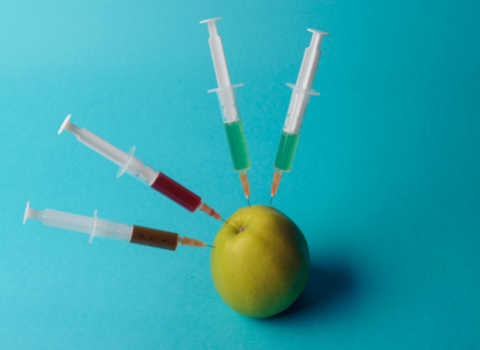
3. The Kosher certification process
Before starting the Kosher certification process, we need to go through some specifications:
- In order to have a Kosher product you need to have Kosher ingredients. These ingredients and their suppliers must also be stable. While Kosher certification organizations do not restrict companies to a specific supplier of an ingredient, they do insist that any new supplier needs to be pre-approved by the Kosher certification organization.
- The easiest way to establish a Kosher certification program is if a company has its own facility that is exclusively dedicated to Kosher certified products. If a company controls the ingredients and equipment, then a Kosher program is viable so long as these conform to Kosher certification requirements. When companies share a facility, produce Kosher and non-Kosher in the same facility, or use a Contract Manufacturer that produces non-Kosher, it may be impossible to provide Kosher certification under these circumstances. A Kosher certification organization may deem this a high risk situation and won’t get involved or the company will nix the idea due to the cost of full-time supervision of production which can at times be required. With that said, it is necessary to point out that there are facilities that produce Kosher and non-Kosher on the same equipment and within the same facility that are Kosher certified and find it worthwhile and fiscally viable. These factors depend on the specifics of the company.
- Some companies are committed to a very specific and exact ingredient. For example: wine, vinegar, cheese, yeast, aromas, liquor or flavorings that are not available as Kosher or do not offer Kosher options that have the same quality, taste, or pricing, this will make Kosher certification not possible.
- Many people think that every ingredient used in a Kosher certified product requires a Letter of Kosher Certification to be considered truly Kosher. This is not an accurate assumption. However, most of the ingredients that do require a Letter of Kosher Certification.
We, at SIKS have to control every product in order to make sure that all of them are Kosher or do not have any prohibited ingredients such as animal fat for example… Meat, whether from a land animal, fowl, or fish, is a highly sensitive ingredient in Kosher law. This ingredient often requires full- time rabbinic supervision during production and where it is employed.
4. Procedure
A company wishing to apply for Kosher certification has to send us their company name, contact information and the nature of the product/s the company produces. Soon after, the company will be contacted by a rabbinic coordinator specializing in that field to guide and service throughout the process.
Assessment – A rabbinic representative of SIKS will be sent to inspect the facility, define the necessary actions and procedures needed for the company to be certified Kosher. The costs for operation and Kosher certification will be assessed on the basis of the review.
Rates & approval – Costs depend on the distance the representative travels, frequency of visits required, complexity of the task and the number of products. After inspection, the Rabbinic Coordinator completes a report and any issues are addressed and resolved.
Certification – After a contract is approved and signed, a company receives its Kosher certificate for one year.
5. About SIKS
The increasing demand for Kosher food products around the globe is having a tremendous effect on the food industry, and more and more respected companies are turning to SIKS for Kosher certification. As we continue to be committed to the highest quality of customer service, ethical business practices and uncompromising integrity, world famous brands such as Divella, Colavita, Moellhausen and Bolero are proud to be under our very own SIKS Kosher certification.
SIKS’ superior reputation and its guarantee to provide affordable and internationally acceptable Kosher certification have made it one of the world’s most sought after Kosher symbols.
The success of SIKS over the past two decades is proof that leading global changes and attracting the most well know household names is solely due to the quality of a business. With few, yet highly qualified individuals in offices in the USA, Italy and in Israel, SIKS will continue to have a wide effect on the marketplace, offering food manufacturers worldwide the most trusted Kosher approval.
Year after year, SIKS regularly attends major international food and beverage trade fairs such as PRONTO Food, Anuga, SIAL, The NASFT Fancy Food Show, Tuttofood and Cibus. Considered the “Summit meetings” of the sector, SIKS considers these to be ideal venues for keeping up with the latest trends and maintaining close relationships with those involved in the food industry.
For any further information, please visit our website, send us an email or call us :
www.siks.org
E-Mail: italy@siks.org
Office: (+39) 011.753. 8619
Thank you for your interest in our company.
Our Experience
In today’s constantly growing Kosher-food market, it’s important to be backed by the best in the business. There is a superb opportunity today for food manufacturers to take a healthy bite out of a 870 billion dollar market, a market that is experiencing an annual growth of 12%! Jews, Muslims, vegetarians, vegans and in fact anyone who is attracted to the promise of higher quality food from a reputable source will be looking for a trustworthy Kosher approval. The SIKS symbol is highly identifiable to consumers around the world and can give your private business label a huge increase in brand awareness and boost sales like never before.

